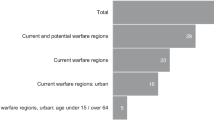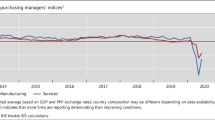Abstract
Since the sovereign crisis erupted in the autumn of 2009 when the true scale of the Greek fiscal deficit was revealed, the European Union (EU), and especially the euro area, has staggered from crisis to crisis. Major initiatives have, however, been taken to improve economic governance and to put in place a more resilient framework for the euro. This article assesses how the EU has responded to the crisis and offers explanations for why the reform process has been slow and indecisive. It shows that potentially enduring solutions are on the table, but that they have been hard to introduce because of differing national perspectives and disagreements about how the burdens of adjustment should be shared. The article concludes by setting out plausible options and explaining what they entail.




Similar content being viewed by others
Notes
The very poor record of macroeconomic forecasting by all the leading organisations during the crisis suggests that these forecasts have to be interpreted with great caution.
These data reflect revisions made since Greece was adjudged to have passed the euro entry criteria
According to the Commission’s autumn 2011 economic forecasts
When Latvia and Hungary came under strong pressure to depreciate their currencies in 2009, a compelling reason to resist was that a high proportion of private borrowing (notably mortgages) was denominated in Swiss francs, yen or euros so that devaluation would have led to private bankruptcies.
References
Athanassiou P (2009) Withdrawal and expulsion from the EU and EMU: some reflections, ECB Legal Working Papers Series No. 10. Frankfurt: European Central Bank
Barrios S, Iversen P, Lewandowska M, Setzer R (2009) Determinants of intra-euro government bond spreads during the financial crisis. European Economy Economic Papers 338, November 2009
Begg I (2009) Regulation and supervision of financial intermediaries in the EU: the aftermath of the financial crisis. J Common Mark Stud 47.5:1107–1128
Begg I (2011) Fiscal union for the euro area: an overdue and necessary scenario? Bertelsmann Stiftung, Gütersloh
Bordo M, Markiewicz A, Jonung L (2011) A fiscal union for the euro: some lessons from history NBER Working Paper no. 17380, http://www.nber.org/papers/w17380
Buti M (2011) The political economy of EU frictions, speech to Pioneer Investments European Colloquia, Corte Franca, 14th September 2011
De Grauwe P (2006) What have we learnt about monetary union since the Maastricht Treaty? JCMS—J Common Mark Stud 44:711–730
de Larosière J [chairman] (2009) The high-level group on financial supervision in the EU: report, Brussels, 25.02.2009
European Commission (2011) Green paper on the feasibility of introducing stability bonds. COM(2011) 818, Brussels 23.11.2010
Schmieding H, Hozheinz P, Quitzau J, Rossen A, Schulz C (2011) The Euro Plus Monitor: progress amid the turmoil. The Lisbon Council, Brussels
Von Weizsäcker J, Saha D (2009) EU stimulus packages. Estimating the size of the European stimulus packages for 2009: an update. Bruegel Policy Contribution 2009/2. Bruegel, Brussels
Author information
Authors and Affiliations
Corresponding author
Rights and permissions
About this article
Cite this article
Begg, I. The EU’s response to the global financial crisis and sovereign debt crisis. Asia Eur J 9, 107–124 (2012). https://doi.org/10.1007/s10308-012-0304-8
Published:
Issue Date:
DOI: https://doi.org/10.1007/s10308-012-0304-8




